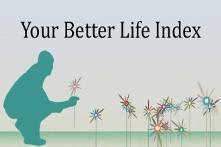Israel performs poorly in OECD Better Life Index
The report acknowledged that 80 percent of adults aged 25-64 have earned the equivalent of a high-school degree, above the OECD average. But it pointed out that Israeli students scored an average 459 in reading literacy, math and science in the OECD’s Program for International Student Assessment, below the global average of 497. It added that Israeli females outperformed their male counterparts by 13 points, wider than the average OECD gap of 9 points.
Overall, Israelis were found to be more satisfied with their lives than the average citizen of other OECD countries. Israeli men gave their lives a grade of 7.4 out of 10 and Israeli women gave their lives a grade of 7.3, compared to the OECD average (for both genders) of 6.7. However, Israel’s life satisfaction data revealed a particularly high degree of social inequality; the top 20% of Israeli income earners graded their lives an 8.0, but the bottom 20% only graded theirs a 6.6.
A lack of affordable housing was one of the central issues highlighted by last year’s social justice protests, and it was this issue that the OECD identified as Israel’s Achilles’ heel. The report found that Israelis spend an average of 22% of their disposable income on keeping a roof over their heads, about the same as the OECD average. But it emphasized that the country suffers from a problem of overcrowded housing, pointing out that the average home contains 1.2 rooms per person, less than the OECD average of 1.6 rooms per person.
Israel’s most glaring weakness was civic engagement, in which it ranked last, below even Russia. Israelis were only slightly more distrustful of their political institutions than the OECD average, but the country’s score was downgraded because of weak freedom of information laws. According to the OECD, Israelis can file an information request in writing or online, but not yet by telephone or in person.
In addition, the report said, there are no provisions for anonymity or protection from retaliation.
The report was released as OECD finance ministers gathered at an annual conference in Paris. Finance Minister Yuval Steinitz emphasized the importance of investments in his speech to the conference on Wednesday, saying: “Investments are the main engine of growth, and Israel will continue to make every effort to increase them.”
Nadav Shemer

